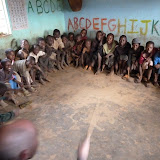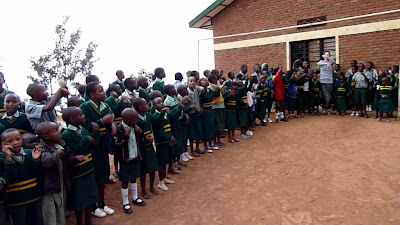Our next trip to the city of Gulu in the far north of Uganda took us two days to complete, including 14 hours in crammed buses, a night in a rundown hotel in the bustling capital Kampala, crossing the Equator (Danny swears he felt his stomach fluids churning in the other direction once we had passed it), and being observed by dozens of baboons on the side of the road that seemed to be baffled by the caged humans in the bus who passed through their territory (Fabienne missed the baboons, as she was stuck between heavy luggage and a sick pregnant woman, and could not turn her head far enough).
Also, as we traveled northward, we saw less and less modern houses and more traditional huts made of straw and mud. It seems that we haven't seen the worst of this country's poverty yet. In Gulu we spent 3 days with children from the SOS Children Villages, an international organization set to give shelter and support to orphaned children, and to children at risk. In every house in the village there are about 10-12 children, with one adult woman who cares for them and loves them, and in return they call her Mama.
From all the hodgepodge of death-dealing viruses in Africa, Danny managed to catch a mild form of flu. So with a sneeze, a cough and a slight fever, he stayed in the hotel on the first day, and Fabienne had to give the first workshop alone to more than 80 children at once, ages 3 to 16. This was quite a challenge, but thanks to the passion and enthusiasm of Mama Kevin, the workshop was fantastically successful. In any case, when Fabienne returned home she made it very clear to Danny that he would not be sick the following day.
The northern region is not as dangerous as it used to be, but it is still turbulent as it is close to the borders with Sudan and Congo, where just last week the UN stood helpless as 200 women were raped in a village in east Congo, close to Gisenyi, Rwanda, where we were just ten days ago. Children are still being abducted and recruited to vicious militias, and poverty prevails.
It is apparently the wet season here right now. We discovered this on the second night when we woke up to a booming thunderstorm. The next day we gave a workshop together in somewhat muddy conditions.
It is apparently the wet season here right now. We discovered this on the second night when we woke up to a booming thunderstorm. The next day we gave a workshop together in somewhat muddy conditions.
In contrast to orphaned children in south Uganda who lost their parents mainly to various diseases, the parents of the children here in the north were mostly killed during the violent conflict in the region. Some children were recovered from militias who kidnapped them with the intent of turning them into child soldiers, some were found wounded by bullets or machetes in raided villages, one child was found when she was just a little baby, suckling her dead mother's breast.
The children's circumstances translate directly into their behavior. In comparison with the children in south Uganda or Rwanda, the children here are very active, occasionally violent (flip-flops and little children were flying in different directions during the workshops), cannot sit still for a long period, and have concentration issues.
These kids are much more energetic than the sometimes languid children we have met in our trip. Instead of us leading them from one activity to another, or having to excite them, the kids here were the ones who pushed us forward. They also sing and laugh SO LOUD that we came back to the hotel feeling like we had spent the afternoon clubbing: a peep in the ear, hangover, and a big silly smile. We indeed had so much fun!
So tomorrow we are heading back to central Uganda, where we will work in two more SOS Children Villages, in Kakiri and Entebbe, and another organization in Kampala... stay tuned!
These kids are much more energetic than the sometimes languid children we have met in our trip. Instead of us leading them from one activity to another, or having to excite them, the kids here were the ones who pushed us forward. They also sing and laugh SO LOUD that we came back to the hotel feeling like we had spent the afternoon clubbing: a peep in the ear, hangover, and a big silly smile. We indeed had so much fun!
So tomorrow we are heading back to central Uganda, where we will work in two more SOS Children Villages, in Kakiri and Entebbe, and another organization in Kampala... stay tuned!
 |
| On the road - sharing a taxi motor (boda-boda) in Gulu, Uganda |











































